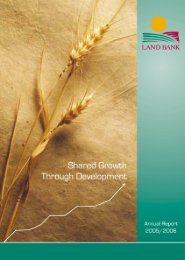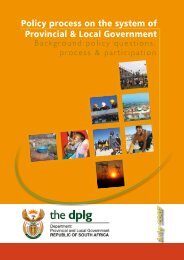Human Settlements Review - Parliamentary Monitoring Group
Human Settlements Review - Parliamentary Monitoring Group
Human Settlements Review - Parliamentary Monitoring Group
You also want an ePaper? Increase the reach of your titles
YUMPU automatically turns print PDFs into web optimized ePapers that Google loves.
<strong>Human</strong> <strong>Settlements</strong> <strong>Review</strong>, Volume 1, Number 1, 2010<br />
that the Copenhagen process was an important<br />
milestone in the huge cultural transition which<br />
is continuing to gather momentum (Cullinan,<br />
2009).<br />
There is a movement in Latin America around<br />
“The Rights of Mother Earth” pioneered by<br />
Ecuador and Bolivia. The Bolivians supported<br />
by at least nine other Caribbean and Latin<br />
American countries are arguing that the reason<br />
why we have climate change and a host of<br />
environmental and social issues is that most<br />
political systems (whether based on capitalism<br />
or socialism) are inherently destructive<br />
because they do not take account of the needs<br />
to strike a balance between the interests of<br />
humans and those of other members of the<br />
Earth community (Cullinan 2009).<br />
Ecuador is exceptional in opting to make<br />
a fundamental change to the architecture<br />
of its governance system by recognising<br />
rights of Nature and redefining its concept of<br />
development. There the existence of a large<br />
number of people who had not wholly adopted<br />
Western consumerist values, appears to have<br />
been a crucial factor in securing the recognition<br />
of the rights of nature in the Constitution.<br />
Calls for a Universal Declaration of the Rights<br />
of Mother Earth to the United Nations indicate<br />
the potential for these ideas to spread rapidly.<br />
“In Latin America thus ‘defend the rights<br />
of Mother Earth’ is a battle cry not only for<br />
environmental protection but also for social<br />
justice and freedom from destructive cultural<br />
imperialism (Cullinan, 2009).<br />
“They point out that in the same way that a<br />
leaf will only flourish if it is part of a healthy<br />
plant growing in fertile, well-watered soil,<br />
so individual human wellbeing can only be<br />
sustained by building healthy communities<br />
within healthy ecological communities. This<br />
traditional wisdom is as valid today as it ever<br />
was. <strong>Human</strong> rights are meaningless and<br />
cannot be sustained if Earth has no rights. The<br />
right to life is an empty slogan without food and<br />
water which can only be provided by the Earth”<br />
(Cullinan, 2009)<br />
This movement appears to understand<br />
that mindless pursuit of GDP growth and<br />
material accumulation is a fatally defective<br />
developmental model. Recognising that the<br />
community of life which sustains us has a right<br />
to integrity and health and enforcing those<br />
rights is a precondition to maintaining healthy<br />
human communities, not a competing interest<br />
(Cullinan, 2009)<br />
Ecuador’s Constitution which aspires to “Living<br />
Well” is a strong indicator that a centuriesold<br />
logjam in legal and political thinking and<br />
practice is beginning to break-up. Pioneering<br />
work is being done around the world to replace<br />
laws and governance systems that facilitate<br />
the exploitation of Earth with systems based<br />
on the recognition that human well-being is<br />
a consequence of the well-being of the Earth<br />
systems that sustain us.<br />
The reasons why legal systems are failing to<br />
protect the Earth community is because they<br />
reflect the underlying beliefs that humans are<br />
separate from, and superior to, all other-thanhuman<br />
members of Earth whose primary role<br />
is to serve as “natural resources” for humans<br />
to consume. These beliefs are demonstrably<br />
false. <strong>Human</strong>s are of course, but one of many<br />
species of mammal that have co-evolved<br />
138





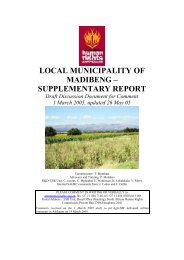
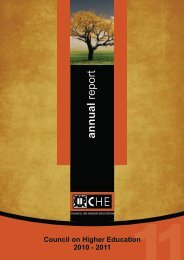
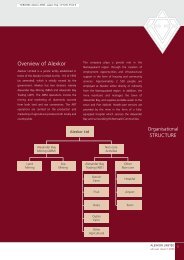
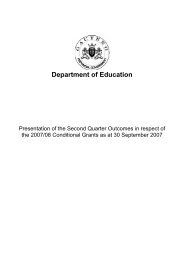
![National Research Foundation Annual Report 2008 / 2009 [Part 2]](https://img.yumpu.com/49774036/1/177x260/national-research-foundation-annual-report-2008-2009-part-2.jpg?quality=85)

